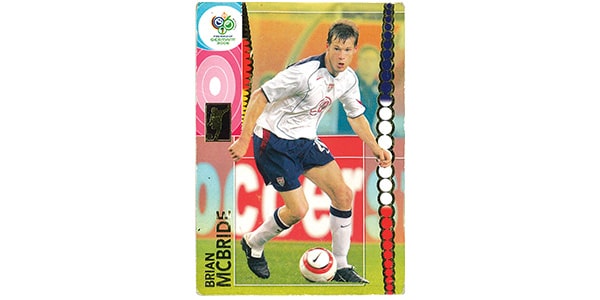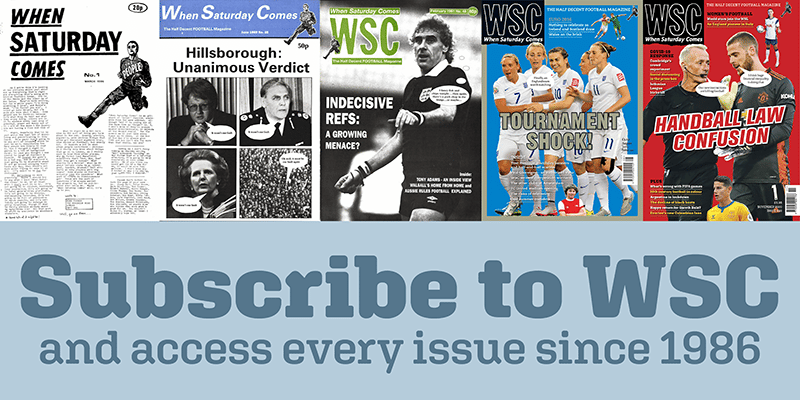
Having led from the front throughout a tumultuous period, Brian McBride still holds a special place in the hearts of US fans
By Alyssa Clang
March 11, 2024
Brian McBride’s 2006 World Cup Panini trading card sits in the back of my wallet, lodged behind old hotel room keys and long–expired corporate IDs. The card is creased and aged now, with outdated stats and bent corners, but it’s retained its technicolor vibrancy all the same.
I tell people it’s a relic, and they tend to assume it’s a relic from a period of American soccer we won’t get back: a period of heart-bursting hope and desperate hilarity. They rarely assume the truth: that it’s a literal relic, a blessed square of cardstock, one that just might be the holiest trading card on earth.
Brian McBride was a stoic, graceful striker, one who often looked out of place in the big-hearted but immature US teams of his era. While the likes of Frankie Hejduk and Pablo Mastroeni played with the reckless abandon of sugared-up toddlers, tripping each other into their opponent’s nets while lasering own goals into their own, McBride was the chaperone, the voice of reason, the token adult.
When McBride first moved to England in 2000 American soccer was languishing at a dangerously low ebb. Major League Soccer, the national league born from our 1994 World Cup hosting, was struggling to make ends meet. The US national team had crashed out of the 1998 World Cup without winning a single game. American fans like me were laughed at by everyone, including our own countrymen, for our faith in such a doomed project.
McBride was one of the key architects of American soccer’s turnaround. He scored a goal at the 2002 World Cup that eliminated Mexico and pushed the US to the quarter-finals for the first time in over 50 years. He joined Fulham and secured a starting position at a Premier League club, something that would have been unthinkable for an American player just a few years earlier. And he worked hard to sell American soccer for precisely what it was: optimistic, raw, earnest, and more than a little silly.
I’m not sure how this card ended up in my possession. But I’m not surprised that his is the one I held onto for all these years. When American soccer felt like it was going nowhere, McBride was the one who scouted us a new path.
When I moved to Europe for the first time I stuffed McBride’s card in my wallet for safekeeping. It reminded me that Americans abroad were capable of greatness; of representing our culture with pride while seamlessly celebrating the cultures of others. Shortly after touching down on European soil, I found myself sitting in a cold and rainy St Peter’s Square for a papal blessing I most certainly did not qualify for. I was a committed atheist who’d been dragged along by a well-meaning but overbearing friend, and I was fiercely uncomfortable. You don’t have to believe in God, they told me, eyes shining. But surely you believe in the power of faith.
Pope Benedict XVI – Benny Sixteen as I called him, much to my friend’s chagrin – took the dais to bless the crowd in a multitude of languages. He closed the session by asking us to hold up our religious items to be blessed.
As the crowd around me pulled out crosses and glared at my empty hands, I panicked. With nothing to offer, I rummaged through my wallet and whipped out McBride’s card. This counts as a religious item to me, I reasoned. If Benny Sixteen was surprised, he didn’t show it, and his Latin prayer echoed around me while raindrops beaded on the card’s glossy surface.
Was it sacrilegious? Potentially. (Clearly, I’m no expert.) But my friend was right. I did believe in the power of faith, and McBride’s card proved it. The 2006 World Cup was no high point for US soccer; we exited at the group stage after losing 3-0 to the Czech Republic. But I kept a memory of it because I believed we were growing toward something bigger. I believed that we would win. I still do.
McBride’s card still lives in my wallet, but these days I rarely tell anyone about its unique history. I don’t need to. In a world where American soccer is healthier than ever and Fulham have christened the Craven Cottage sports bar McBride’s, neither he nor his card need any further endorsement.
This article first appeared in WSC 436, November 2023. Subscribers get free access to the complete WSC digital archive
Want to see your writing published in WSC? Take a look at our pitching guide and get in touch
Tags: Object Lesson, United States
